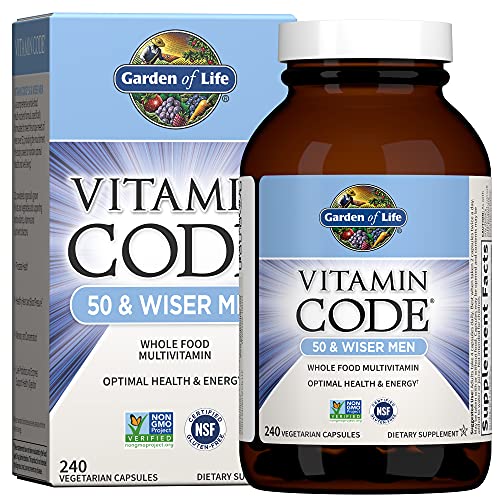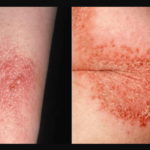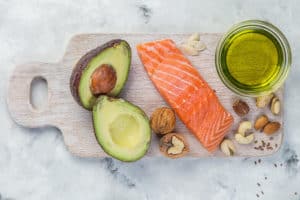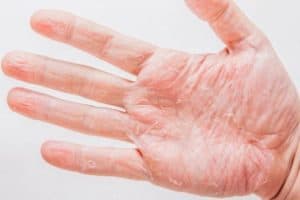Itchy skin can arise from a number of causes. Causes include dry skin, eczema, allergies, hives, pregnancy, nerve disorders, anemia, and much more.
Scratching provides temporary relief but can damage your skin and lead to more itching. The key to treating itchy skin is to treat the underlying cause. The underlying cause of itchy skin could very well be traced back to a vitamin deficiency. What vitamin deficiency causes itchy skin?
Itching can be caused by a deficiency in many different vitamins such as:
- Vitamin B12, e.g., from salmon
- Vitamin A, e.g., from dark leafy greens
- Vitamin C, e.g., from citrus
- Vitamin E, e.g., from almonds
- Vitamin B7 (biotin), e.g., from walnuts
Get a blood test done to see if you are deficient in any of these vitamins. Once you know what you are low in, eat foods rich in the missing vitamin or take a supplement.
Read on to learn more about what vitamin deficiencies causes itchy skin and how you can improve your skin.
Also, for an excellent vitamin for dry skin, take a look at our top pick, the Garden of Life Vitamin Code. Garden of Life includes the best ingredients along with live probiotics, enzymes, and antioxidants for greater absorption.
Click here to see it on Amazon.
Click here to see it on Amazon.
What Vitamin Deficiency Causes Itchy Skin?
1. Vitamin B12
The importance of vitamin B12 in the role of itch-free skin is most telling in the story of 72-year-old Pauline Newton from Essex, England.
She suffered through three years of unbearable itching, which she described as a ‘living hell.’ She said the scratching left her body covered in weeping wounds and prevented her from getting a full night’s sleep.
She was also severely lacking in energy and always tired throughout the day. She went through a frustrating search with doctors who didn’t know what to suggest, including one doctor who even said it could be cancer!
Finally, one doctor suggested she do a simple blood test, and her diagnosis included that she had a lack of vitamin B12.
Within hours of her first vitamin B12 injection, the persistent itch in her skin subsided. She said it was an incredible transformation. She still felt an itch from time to time but was itching a lot less and was more bearable.
Pauline’s B12 deficiency was found to be caused by a type of anemia called pernicious anemia. Common for people over 60, pernicious anemia is an autoimmune condition caused by antibodies destroying protein that is required to absorb vitamin B12.
This can lead to itching because B12 is required to form fatty sheaths that cover the nerves. If they don’t form correctly, it can affect the way nerve impulses are sent to the brain, and this can lead to the itch sensation.
Pernicious anemia is the most common cause of vitamin B12 deficiency. Other causes include diet — vegans and vegetarians can be at risk for becoming deficient as they don’t eat meat, seafood, or eggs, which are rich sources of B12.
Vitamin B12 is available in many different forms, including parenteral, which is injected by a physician, and sublingual, which dissolves under the tongue. Taking B12 sublingually is easy, but most patients would need to ingest the supplement daily, which could be difficult to remember to do each day.
Injections are a commonly prescribed treatment. They are administered by a healthcare practitioner, so you get the exact dosage. You can get them periodically, like once a month or even more spread out instead of every day.
Pauline got a vitamin B12 injection every month. If you get a blood test done and find your B12 is low, your doctor can recommend the best method for taking B12 for you.
2. Vitamin A

Vitamin A is a fat-soluble vitamin which means it is stored in the fat cells in your body. Vitamin A is important in that it helps to promote the production of sebum.
Sebum is natural oil produced by your body that helps keep the skin hydrated. Well-hydrated skin means that you are less likely to get dry skin, and less dry skin means less itching. To learn more about how to combat dry skin, see the post I wrote on vitamins for dry, itchy skin.
It has also been suggested that vitamin A deficiency may increase your risk of developing acne. If you are deficient in vitamin A, you’ll have an overproduction of the protein keratin in your hair follicles.
This increases your risk of acne because it is harder for your dead skin cells to be removed from hair follicles, and this leads to blockages.
Vitamin A can be supplemented or consumed by eating a well-balanced diet. Food that is high in vitamin A includes spinach, squash, fish, and eggs.
3. Vitamin C
Another vitamin that helps keep your skin hydrated instead of dry is vitamin C. Vitamin C is among a group of antioxidant vitamins, along with vitamin E.
The University of Maryland Medical Center noted that antioxidants are responsible for preventing damage that free radicals can cause to the skin.
Free radicals are harmful compounds that are formed in the body when food converts to energy. A build-up of the free radicals over time is believed to speed up the aging process and leads to skin conditions such as dry, itchy, and even wrinkly skin.
Antioxidants, including vitamin C, aid the body in locating and destroying these dangerous free radicals.
Vitamins C is necessary for regularly manufacturing and repairing all the tissues in your body, including the skin. It is key in the production of collagen, which is the main structural protein found in skin and other connective tissues.
The University of Maryland Medical Center also found that vitamin C is essential in the healing of wounds. It is essential that you consume enough vitamin C in your diet to ensure your skin avoids becoming dry, scaly, rough, and itchy.
Vitamin C is not hard to get as it can be found in many foods such as citrus fruit, tomatoes, berries, melon, potatoes, peppers, squash, cabbage, and leafy greens. Vitamin C is also very effective when used topically on the skin. Use in and out for maximum benefit.
See the below video, which talks about why we itch and how to stop itchy skin by getting the right vitamins and nutrients through diet:
4. Vitamin E
Vitamin E is key for strong, healthy, hydrated, itch-free skin. Like vitamin C, vitamin E protects your skin from free radical damage as well as damage from pollutants in the environment.
Vitamin E deficiencies are generally rare. They are more likely found in those with digestive problems or who have diseases such as cystic fibrosis. If you follow a very low-fat diet, you may have low levels of vitamin E.
If a blood test shows you are low in vitamin E, you can increase it from foods such as green leafy vegetables, like spinach, also eggs, nuts, fortified cereals, and vegetable oils.
5. Vitamin B7 (Biotin)
Biotin is one of the B complex vitamins and is responsible for converting carbohydrates and fat in your food to energy.
Biotin is also sometimes called B7, vitamin H, or coenzyme R. Biotin is essential for promoting good skin health as well as strong nails and hair. You need to get it from food sources, except the bacteria in your gut, called intestinal flora, which may produce biotin.
A biotin deficiency isn’t as common as some other deficiencies because many foods contain large amounts of it. But if you are deficient in it, you will experience itchy skin.
Along with itchy skin, biotin deficiency can cause rashes, especially on the face, also dry skin, brittle hair or hair loss, trouble sleeping, nausea, depression, and even seizures.
If a blood test shows you are low in biotin, it could be caused by certain medications you are taking, which prevent your body from absorbing vitamins correctly. Intestinal problems, such as Crohn’s disease or colitis, may prevent your body from absorbing nutrients found in your food.
The recommended daily intake of biotin is fairly easy to attain from a well-balanced diet. Foods include peas, legumes, seeds, root vegetables, whole grains, eggs, dairy, seafood. A supplement also may be prescribed by your doctor if your levels are found to be very low.
See the below video for warning signs, other than itchy skin, that your body is low on essential vitamins:
Take a Multivitamin to Avoid Itchy Skin Vitamin Deficiency
For convenience, you can take a multivitamin, but I can’t stress enough how important it is to take a good quality multivitamin.
A multivitamin is essential when you are not able to afford organic fruits and vegetables, not able to follow a well-balanced diet, on birth control to compensate for nutrient deficiencies, or just to ensure you are not short of any.
There are so many cheap, generic multis on the market that come with chemicals, inferior fillers and are either harmful or a waste of money.
For an excellent multivitamin for dry skin, take a look at our top pick, the Garden of Life Vitamin Code for women or for men. Garden of Life includes the best ingredients along with live probiotics, enzymes, and antioxidants for greater absorption.
Click here to see The Garden of Life Women’s Multi on Amazon.
Click here to see the Garden of Life Men’s Multi on Amazon.
It is best to take a multi with food as it gets absorbed more efficiently. The Garden of Eden brand has a lot of great stuff packed in them, including probiotics and enzymes. I feel more energized when taking them and more at peace knowing that I’m covering all my bases just in case.
The other multi I recommend is the Thorne Research Multivitamin. You need to take 2 of these a day. It doesn’t have the probiotics and enzymes as Garden of Life, but it does provide a high amount of bio-available forms of each vitamin and mineral.
Click here to see it on Amazon.
Conclusion – What Vitamin Deficiency Causes Itchy Skin?
So what vitamin deficiency causes itchy skin? A deficiency in the following vitamins can cause itchy skin:
- Vitamin B12, e.g., from salmon
- Vitamin A, e.g., from dark leafy greens
- Vitamin C, e.g., from citrus
- Vitamin E, e.g., from almonds
- Vitamin B7 (biotin), e.g., from walnuts
It’s a good idea to get a blood test done. The doctor tells you what vitamins you are deficient in. Then ensure to top up those vitamins with the food you eat.
Or, for more convenience, take a multivitamin supplement. Once you top up your vitamins and minerals to optimum levels, the itchy skin should subside or become more under control.








![Bruise Itches [Causes and Treatments for an Itchy Bruise] bruise itches](https://skincaregeeks.com/wp-content/uploads/2021/04/bruise-itches-150x150.jpg)
![Neutral Skin Tone Defined [and Best Colors for Neutral Skin] neutral skin tone](https://skincaregeeks.com/wp-content/uploads/2021/05/neutral-skin-tone-150x150.png)





